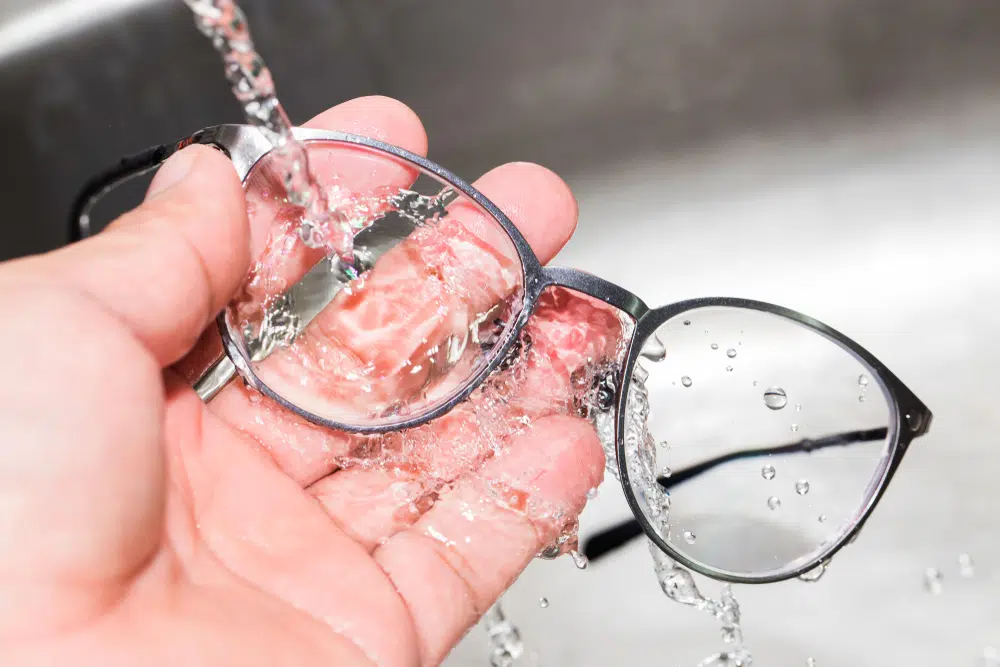The Best Way To Clean And Remove Scratches From Glasses
Keeping your eyeglasses clean on a daily basis will help you maintain their appearance and prevent lens scratches.
In regards to the manner in which glasses should be cleaned, there is a right way and a wrong way.
Cleaning Your Glasses: Steps To Follow
You can clean your spectacle lenses and frames without damaging them by following these tips. These tips will also help you maintain the perfect condition of your sunglasses, safety glasses, and sports eyewear.
1. It is important to wash and dry your hands thoroughly.
The first step in the cleaning of your spectacles is to make sure your hands are free of dirt, grime, lotion, and anything else that might affect the lenses. Clean your hands using a lotion-free soap or dishwashing liquid as well as a soft, lint-free towel.
2. Make sure that your glasses are rinsed with lukewarm water under a gentle stream.
Avoid using hot water, which can damage some eyeglass lens coatings, as this will remove dust and other debris.
3. Apply a small amount of lotion-free dishwashing liquid to each lens.
Generally, dishwashing liquids are very concentrated, so you should use only a small amount. If you prefer, you can apply a drop or two directly to your fingertip. Only use brands without lotions in their formulation.
4. For a few seconds, rub both sides of the lenses and the frame gently.
Ensure that all parts of the frames are cleaned, including the nose pads, temple ends that rest behind the ears, as well as the area where the lens meets the frame – dust, debris, and skin oils are often found here.
5. Ensure that both sides of the lenses and the frame are thoroughly rinsed.
When you dry the lenses, they will be smeared if you do not remove all traces of soap.
6. Gently shake the glasses to remove most of the water.
Ensure that the lenses are clean by carefully inspecting them.
7. Using a clean, lint-free towel, gently dry the lenses and frame.
To protect the lenses, use a tea towel that has not been washed with fabric softener or dryer sheets (these materials can smear them).
The best option is to use a cotton towel that is used for cleaning fine glassware. You must make sure the towel is perfectly clean so that it will not scratch your lenses, nor will it smear them with cooking oil, skin oil or lotion.
8. The lenses should be inspected again.
Using a clean microfiber cloth, remove any streaks or smudges remaining on the lens. Lint-free microfiber cloths can be found at most opticians and photography stores.
It is recommended that you use individually packaged, pre-moistened disposable lens cleaning wipes formulated specifically for use on spectacle lenses when you do not have the above supplies on hand.
That brings us to a very important point – what NOT to use to clean your glasses.
Cleaning cloths and spectacle cleaners
If you are traveling or do not have access to dish-washing soap and clean tap water, there are spray spectacle lens cleaners available for purchase at your local pharmacy or department store.
To remove dust and other debris, use plenty of spray spectacle cleaner to flush your lenses before wiping them dry if you do not have access to tap water to rinse them.
Ensure that the spectacle cleaner you choose is suitable for anti-reflective (AR) lenses if your lenses have anti-reflective coating.
It is important to inspect the lenses prior to wiping them with disposable lens cleaning wipes that are individually packaged and pre-moistened. Dust and debris should be blown off before wiping the lenses in order to avoid scratches.
It is recommended that you use microfiber cleaning cloths for cleaning glasses. These cloths are excellent for drying the lenses and trapping oils to ensure that the lenses do not smear.
In spite of this, because they trap debris so effectively, ensure you clean them frequently. Make sure the cloths are hand-washed with a lotion-free dish-washing liquid and clean water, and then allowed to dry naturally.
How to remove scratches from glasses
Once your glasses are scratched, they are scratched for life. Unfortunately, there is no magic cure for scratched lenses.
There are some products that are intended to reduce the appearance of scratches. However, these products are essentially waxy substances that wear off easily, and the results vary based on the severity of the scratches as well as the location. Furthermore, these products are often prone to smearing AR coated lenses.
You should replace your lenses if you notice significant scratches that are interfering with vision or reflecting light. Scratches can also affect the impact resistance of the lenses, so it is best to replace them as soon as possible.
A durable scratch-resistant coating is essential when selecting spectacle lenses. Ask your optician whether the purchase includes an anti-scratch warranty if you have previously encountered scratched lenses.
When should you have your glasses professionally cleaned
See your optician or the person that sold you the spectacles if your lenses are in good condition but you have been unable to keep the nose pads clean for a long period of time.
Ultrasonic cleaning devices can sometimes be used to clean spectacles more thoroughly, and yellowing nose pads can sometimes be replaced with new ones. However, you should not try any of these fixes at home – consult a professional first.
Use a protective storage case
In the event that you fail to store your spectacle lenses somewhere safe, they may get scratched easily. This includes when you remove them before going to sleep.
The lenses of your spectacles should always be facing up when they are stored in a clean storage case. They should never be placed on a table or counter with the lenses down.
You should store your glasses upside down with the sides open, where they will not fall off a table or work surface. In the absence of a glasses case, place your glasses upside down with the sides open.
It is not possible to keep glasses forever
The lenses of spectacles are scratch resistant, not scratch proof. Spectacle lenses will accumulate scratches over time as a result of normal use, exposure to the environment, as well as when they are dropped or misplaced.
If you wear glasses in dusty conditions or if you own children’s spectacles, you should inquire about anti-scratch warranties from your optician.
The best way to keep your glasses clean and scratch-free for a long time is to follow the above tips.
















